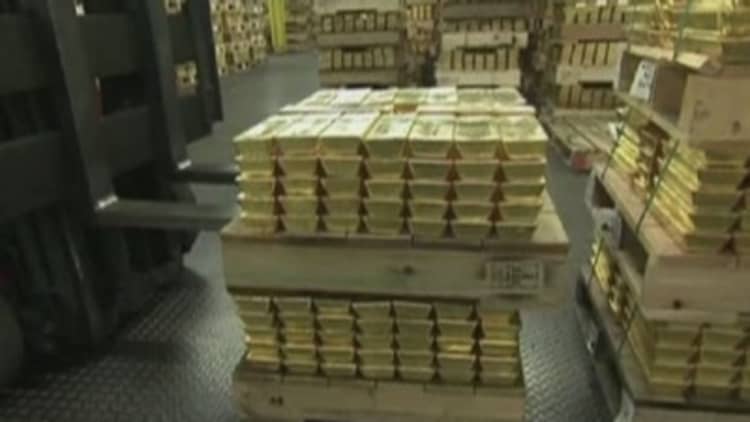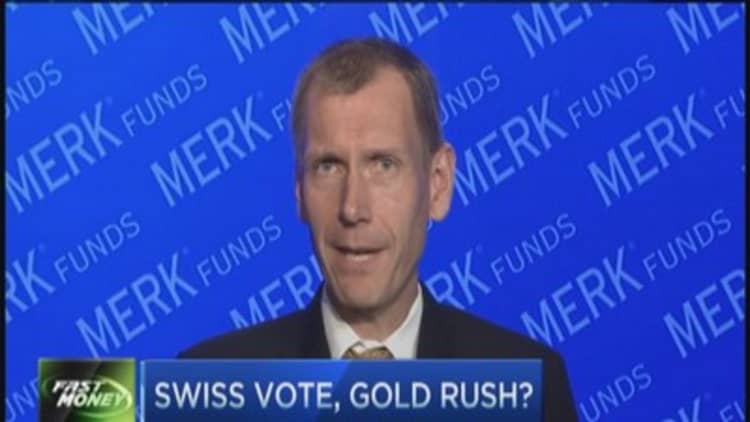
With Switzerland edging toward an important referendum on its gold holdings, high-profile critics and advocates have added their voices to the argument. Meanwhile, the country's citizens have been quietly increasing their own personal reserves.
On Sunday, voters in the European country will head to the polls to decide whether the Swiss National Bank (SNB) should refrain from selling any more of its gold and instead boost its gold holdings from 7 to 20 percent.
The initiative is being proposed by the ultra-conservative Swiss People's party with the intention of boosting the security and independence of Switzerland. However, the idea has one very notable critic in Willem Buiter, the chief economist at the U.S. investment bank Citi, who has deemed the commodity to be in a 6,000-year bubble.
"No central bank should hold any gold reserves, in our view," he said in a research note released on Thursday. Buiter urges caution, saying that a central bank holding 20 percent of its balance sheet in any single commodity is "highly unorthodox" and a "risky investment strategy."
Read More Gold price eyed as investors await Swiss vote
"Investing a vast amount of money in something whose value is based on nothing more than a set of self-confirming beliefs will make for an exciting ride. Whether that is enough to impose it as a requirement on one's central bank is another matter," he added.
Some analysts predict that a "yes" vote could see gold prices surge in the near term. Rob Halliday-Stein, the founder and managing director of online dealer BullionByPost, believes that the price could surge 5 percent in one day if the vote is successful and 20 percent over the following weeks. Halliday-Stein told CNBC that the Swiss referendum was an important topic of conversation among his clients but added that it was not driving any significant buying behavior at his company.
Adrian Ash, the head of research at rival firm BullionVault, said that some of his firm's longer-term Swiss gold investors were growing their personal gold reserves ahead of the referendum.
"Our existing Swiss customers have raised their deposits to buy gold and silver by more than 60 percent already so far in November from 2014's previous full-month average," he told CNBC via email. "Given the opinion polls, that looks a smart and sadly necessary move."
However, he also noted that the traffic to the company's website from Switzerland was unchanged and there had been no sizeable uptick in new Swiss users opening new accounts.
Read MoreCentral banks: The new gold bugs?
Switzerland left the gold standard in 1999 and was the last country to do so. This eliminated the requirement for the country's currency to be backed by gold. Presently, the central bank has a foreign exchange "peg" tying the Swiss franc to the euro and has been buying the single currency in the hope of keeping down the value of the franc and easing the pressures on the country's exporters. The Swiss franc is seen as a safe haven and had a tendency to appreciate steeply before the limit was put in place.

Campaigners for a "yes" vote believe that this currency peg is allowing Swiss economics to be dictated by the euro zone and have warned that a weaker currency could lead to a weaker economy.
Former U.S. Republican congressman Ron Paul, a well-known gold fan, has come out in favor of the "yes" vote, saying that it would be a "slap in the face" to the country's elites. "The Swiss people appreciate the work their forefathers put into building up large gold reserves, a respected currency, and a strong, independent banking system. They do not want to see centuries of struggle squandered by a central bank," he said in an opinion piece published on his website.
Read MoreGold extends losses to third day as oil slumps
Gold advocate Peter Schiff, the CEO of Euro Pacific Capital, has also weighed in on the debate, saying that it would be the "first major counterattack against the forces of fiat currencies and unlimited global QE (quantitative easing)."
The 1999 vote narrowly passed but Sunday's vote doesn't look to be as close. An opinion poll last week by Swiss media outlet 20 Minuten said 58 percent of respondents would definitely vote "no", while just 23 percent would definitely vote "yes". Meanwhile, gold prices have continued to extend a slump this week, trading at $1,187.8 per ounce on Friday morning, with an oil slump indicating that inflationary pressures are almost non-existent. The precious metal is traditionally seen as a hedge against inflation.


